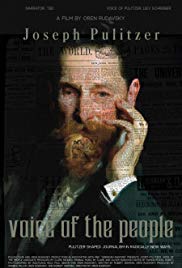
JOSEPH PULITZER: VOICE OF THE PEOPLE
US, 2018, 84 minutes, Colour.
Narrated by Adam Driver. Voices of: Liev Schreiber, Hugh Dancy, Lauren Ambrose, Billy Magnusson, Ryan- James Hatanaka.
Directed by Oren Rudavsky.
While many have heard of the Pulitzer Prizes which are still awarded in a range of areas in the United States, they may not be familiar with the story of Pulitzer himself.
This is a very interesting documentary. It also has some acted sequences, many touches of the docudrama. There is a narration by Adam Driver and a number of well-known actors dubbing the voices of the enacted characters.
Pulitzer was a Jewish refugee from Hungary in the 1860s, arriving in the United States, immediately fighting in the Civil War, then settling in St Louis and becoming involved in collecting stories and, ultimately, newspaper reporting and publication. Moving to New York, he bought further papers, designed a large office building, flourished in his work, his desire for the truth, his intention to cut out dishonesty and corruption.
His main rival at the end of the 19th century was William Randolph Hearst (remembering Citizen Kane), capitalising on American involvement in wars in Cuba and the Philippines – sensationalist reporting, the Yellow Press. For a while Pulitzer was competitive but opted for the opposite of the Yellow Press.
The film shows that he was a strong minded man, workaholic, sadly going blind for the last decade of his life. His family and the next generations were not so much interested in continuing his Empire and, eventually, it was sold. But the significance of his Prizes remains as well as the range of authors, journalists and stories (which are indicated by collage during the final credits).
1. The title, as a journalist, as a voice of the people, his success with newspapers, his career, the aftermath of the Prizes and the courses?
2. The incorporation of photos, newsreel footage? His origins in Hungary, participation in the Civil War, going to St Louis, the jobs, journalistic opportunities, issues, going to New York, the paper, the huge building, the equipment and building and newspaper empire?
3. Docudrama and the staging of scenes, actors’ narrationeddie and voices?
4. Pulitzer in himself, young coming from Hungary, his brother and his coming, also working in papers, touch of rivalry, support? Pulitzer and his opportunities, his participation in the war, so young? Working, the connection with the paper, his articles, eventually buying the paper, building it up, going to New York, the Pulitzer building? An abrasive personality, determined, workaholic?
5. His principles, reporting the news, brief and clear, local content, succinct, with illustrations? Local issues, his stances against corruption?
6. A life of difficulties, leaving St Louis, going to New York, expanding? His marriage – and the formalities? His children?
7. The end of the 19th century, the emergence of William Randolph Hearst, the rivalry, the contrast between the two, their origins, poor versus rich, the status of the United States at the end of the 19th century, Empire, clashes with Spain, Central America, the Philippines, Cuba? The competitiveness and the emergence of the Yellow Press? Pulitzer later changing his mind and being against a Yellow Press?
8. Tragedy towards the end of his life, his going blind, his dependence? Troubles?
9. Working with collaborators, seeing talent, his severity, the distance from his family?
10. Having created an empire – his children not so interested, lingering on, making decisions, selling off interest?
11. But his immortality in his reputation but, especially in the Pulitzer Prizes.